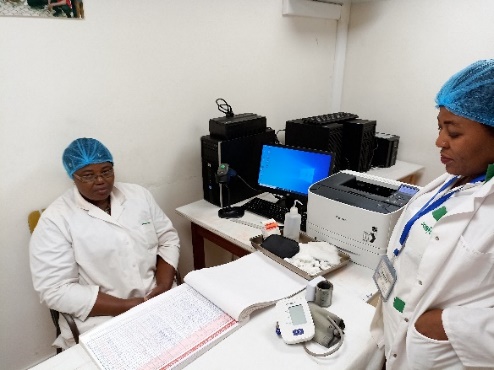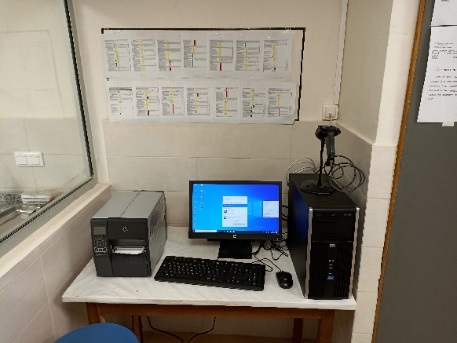SUMMARY OF THE 2022 ACTIVITIES IN CAMEROONIMPLEMENTATION PROJECTS
Blood safety In July 2021, The SBFA Cameroon office has received another ICCBBA support grant to reinforce the quality management system of the Yaoundé University Teaching Hospital Blood Service through the installation of a comprehensive data management and labelling system using the Blood Safety Information System (BSIS – developed with support from SBFA and CDC USA), the AfSBT Stepwise Accreditation, and the ISBT 128 recommendations as a framework. The SBFA has already installed the hardware system. In collaboration with the Jembi Health System, the BSIS software was installed, the AfSBT Standards derived SOPs developed, and appropriate training and mentorship of the staff were conducted. The following support was provided: 1. Assist in the implement an Information systems 2. Support the implementation of a full quality management system towards AfSBT accreditation for the Yaoundé University teaching hospital 3. Support the maintenance of a high level quality system in the two services 4. Supply the two blood services with BSIS related consumables
Installation of BSIS at the Yaoundé University Teaching Hospital
Blood supply Club 25 Cameroon is a humanitarian, apolitical, secular non-profit association of voluntary blood donors. Created since 2018 by students from the Faculty of Medicine and Biomedical Sciences (FMBS), it aims principally at supplying Cameroonian blood banks through voluntary and regular blood donations, raising awareness within the Cameroonian population on voluntary blood donation, creating a framework of solidarity, exchange and wellbeing for its members and promoting health throughout the national territory. It has 80 members devoted to achieving these goals. With the help of the SBFA Cameroon, some partners (Life Line, Oui Care, Canal Olympia), the University Teaching Hospital of Yaoundé (UTHY) and the Faculty of Medicine and Biomedical Sciences (FMBS), as well as the devotion and dynamism of the members, Club 25 Cameroon was able to collect 155 pints of blood in 2018, 225 pints in 2019, 301 pints in 2020, 440 pints in 2021 and about 400 pints in 2022. The C25C remain very ambitious and optimistic for the next school year: ·Obtain over 100 active C25C members. ·Share the vision of C25C in other institutions; National Advanced School of Engineering Yaoundé (NASE) and National Advanced School of Public Works Yaoundé (NASPW). ·Promoting voluntary blood donation within the FMBS. ·Promoting voluntary blood donation in the University of Yaoundé I. ·Educate younger students in secondary and high schools on the importance of volunteer blood donation. ·Increase the visibility of the club through media and social pages. ·Effectively collect at least 100 pints of blood per blood donation drive in 2023 ·Organize activities which enable the development and wellbeing of the members of the club (on the academic and social levels) ·Establish partnerships with 3 major structures. ·Give international visibility to the C25C.
RESEARCH PROJECTS
Study 1 In September 2021, the SBFA Cameroon was granted a total amount of 66,300 Euros to conduct a one year research project entitled “Comparison of Pre-donation Screening and Post-donation Testing of Hepatitis B Infection in Blood Donors using a Randomized Trial in a Cameroonian Hospital Blood Bank (PREDHEP)” Background:HBsAg positive blood units still represent more than 50% of discarded blood units in most Cameroonian blood banks. There is no evidence that the infection pre-donation screening process (PDS) is a practical and cost-saving measure in high-prevalence settings. Objectives:This study intends to assess the acceptability the performance and the benefit of HBsAg PDS. Methods:A randomized trial in a pilot hospital-based blood service in Cameroon will be conducted on. 3,000 consenting blood donors who will be randomly screened for HBsAg pre-donation or tested post-donation (PDT) according to the current standard procedure. We plan to record the donor satisfaction during the post-donation counseling and/or notification, to estimate and compare the cost and the linkage to care rate of each process. The performance of the PDS will be assessed by comparing the sensitivity and specificity of the test and the residual risk of HBV in the blood donations Expected results:We expect the cost of PDS to be lower and the donor satisfaction score not to be lower than in the PDT. The PDS may improve also the care of HBV-infected blood donors. The study is being conducted with the full authorization of the ethical committee and the blood services.
Study 2 The Vitalant Research Institute and the Duke University extended the project entitled ‘Caractérisation des infections récentes par le virus de l’immunodeficience humaine chez des donneurs de sang camerounais-Phase 2’.
Background:
Few data are available on incidence of unusual and recombinant subtypes in blood donations as most countries and blood services focus on the common forms. It is important to assess and monitor the emergent risk of mutations and to define appropriate screening approaches. The pilot phase included in Cameroon, Burkina Faso and Central Africa Republic. The three countries consecutively collected and analyzed 173 repeatedly reactive HIV samples for confirmation (in Cameroon) and for genotyping, sequencing and recency in the US. The results of the study are being analyzed.
Objectives:Building upon the success of this pilot phase work, the current application proposes to extend the monitoring of HIV infection in a greater number of countries with the following Aims: · Aim 1) Perform annual cross-sectional studies of HIV 1&2 genotypes · Aim 2) Determine incidence of the genotypes · Aim 3) Form a biorepository of HIV 1&2 genotypes · Aim 4) Monitor the HIV screening performance of the current strategies used in Francophone countries Methods: The proposed Epidemiological surveillance project objective was to collect and analyze a total of 400 HIV EIA repeatedly reactive blood donor samples (200 samples annually) from 6 Central and West African francophone blood services ( 4 new centres) during a two-year time period from September 2021 – August 2023. We will provide the following outcome variables: · Proportion of recent HIV infection · Types and Proportion of HIV genotypes · Type of HIV screening reagents that are reported efficient on the identified genotypes · Phylogenetic analysis of HIV variants The IRB approval will be obtained from the SBFA ethics committee and the Cameroon National Ethics committee.
Expected results:This will have high impact in several areas of transfusion medicine and infectious disease. First, this would both provide information to the blood services on the diversity of viruses currently circulating in donor populations and will be useful for an external quality assessment scheme of HIV screening. Second, the biorepository will increase transfusion safety by providing samples for molecular epidemiology, viral discoveryand increase viruses represented in the EQAPOL Viral Diversity Panel, in collaboration with investigators at VRI. Finally, the effort will build capacity for biologic research at West African blood centers, and serve as a pilot project for a larger surveillance in that region of Africa.
|






